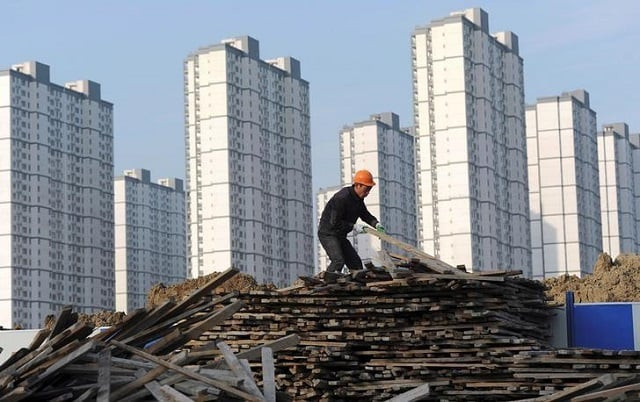Pakistan’s economic growth still hindered
Pakistan could not improve substantially upon its exports which stood at $7.8 billion in 1999

PHOTO: REUTERS
In this context, the most relevant is the growth in Gross Domestic Product (GDP), along with increment in exports as well as investment in key sectors. Over the past decade, Pakistan never seemed to take off in the export and investment sectors. Thereby, GDP growth was restricted to below 5%.
That is a discouraging situation for an economy that has all the potential to have GDP at minimum 7%, export growth at nearly 15% and investment in the engineering, production and marketing sectors at minimum 20%. Furthermore, it is extremely saddening that Pakistan could not improve substantially upon its exports which stood at $7.8 billion in 1999 and grew to $17 billion by 2007, but no further between 2008 and 2017.
Exports are not just an indicator in the progress of foreign exchange earnings, but also in the situation of balance of payments and the ability to import advanced technology and attract softer loans and investments for faster growth.
Punjab Economic Forum 2017: Corruption, incompetence have devastated Pakistan: CM
The question remains what happened and what should be done to improve this situation.
I have been pleading through my submissions in The Express Tribune over the past year that Pakistan needs an enabling environment for attracting investments, foreign exchange and exports growth to acquire the tools of engineering and technology for faster growth along the infrastructure and production lines.
Now, let me extend this issue to a wider sphere of political stability and political-economic decision making.
Take a look at the progress of the Asian Tigers and you would not miss the phenomenon of political hurdles which were surpassed to put countries on faster lanes to progress.
Singapore, Malaysia and South Korea are glaring examples in this context. Power structures were revisited to make vital corrections and unfetter the potential of progress in these countries and in India too, where a boisterous but functional democracy helped in bringing at least 30% of the country’s population into the middle class tiers.
Of course these countries resolved ages-long political conflicts in the internal arenas to open up these economies to influences that could not have contributed to faster progress if the internal markets had not opened up to the prospects of growth.
The lesson number one in the modern market expansion is the local consumerism that contributes to a commensurate growth in the sectors of exports, technology and engineering.
Read the newspapers of these countries and you will have an impression that internal political struggles for turf continue to make headlines, however the basic issues pertaining to economic progress have long been resolved. And for this purpose, a national dialogue and conflict-resolution were the critical mechanism.
Unfortunately, Pakistan is on a snail’s pace on this track and lacks the civil society and political forces that can come together on a national platform to resolve the power tussles.
Overseas Pakistanis: Expats credited with economic growth
Lately, Prime Minister Nawaz Sharif’s government has been actively perusing powers to the civilian side, but it has not been consistent on this issue. The government could not mobilise the civil-society forces to attain dividends that appear to be ambitious but selfish to the ruling party. The prime minister has not been able to make such pursuits into a national agenda for lack of the acumen to figure out that it is not just a political gain but the progress of economy that should be focused.
While he has been persistent in giving the nation the belief that he needs more powers to complete his agenda of infrastructure development, he has not come forth with the argument that progress in GDP, exports, engineering and investment spheres is vital to supplement to the agenda for infrastructure improvement.
The parliamentary committees that are relevant to this issue are also moribund as they do not take up the issue beyond criticism of the bureaucratic channels. Progress in these areas is not just bureaucratic issue, it needs national political conflict resolutions which opens up the arteries the clogging of which restricts faster economic growth. When the prime minister complains that his opponents are against progress, he does not argue that he needs more powers for decision-making to attract investment and trigger improvement. He does not argue where the powers are clipped and how to attain a breather from restrictions and put the country’s resource-potential on faster highways.
Additionally, he does not appeal to the political forces and the civil society to come to his help and launch a national conflict-resolution mechanism without which Pakistan cannot have a government with powers that can take potential decisions to guarantee progress in GDP, exports, engineering and investment spheres.
The best argument his finance minister offers in support to the performance of his government is the projection of upswing on the stock-market index and revenue collection. These two spheres are not the barometers of unfettered progress of an economy. This government should take the issue of progress seriously and come out with a national agenda of progress that ensures increasing employment and investments.
The writer has worked with major newspapers and specialises in the analysis of public finance and geo-economics of terrorism
Published in The Express Tribune, May 29th, 2017.
Like Business on Facebook, follow @TribuneBiz on Twitter to stay informed and join in the conversation.



















COMMENTS
Comments are moderated and generally will be posted if they are on-topic and not abusive.
For more information, please see our Comments FAQ